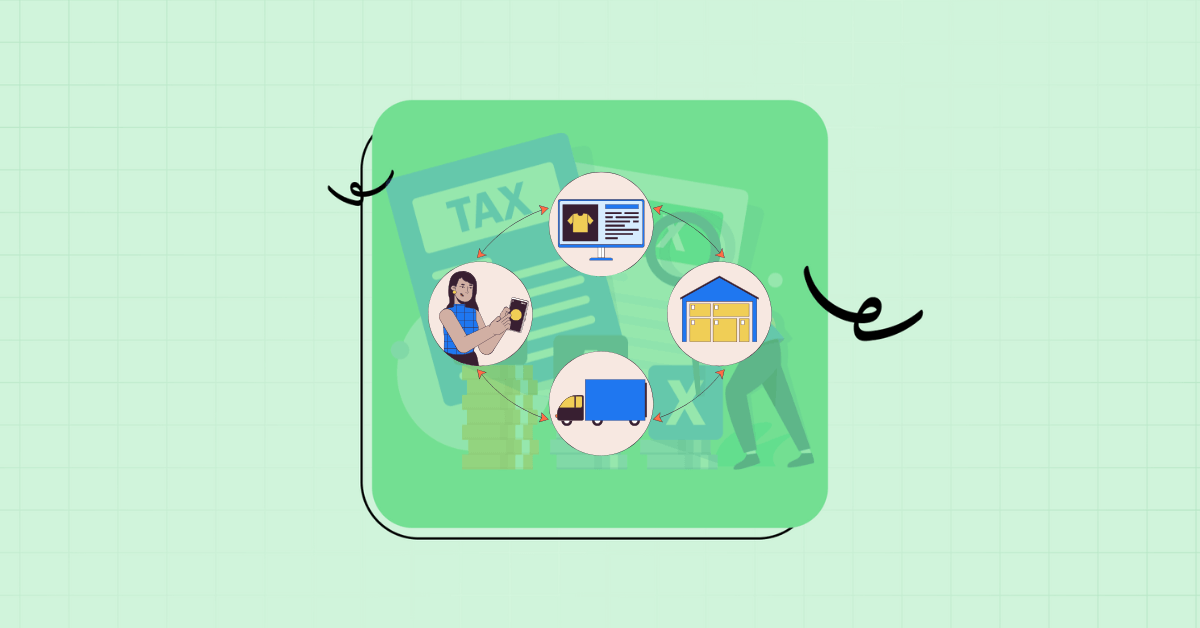
One minute you’re scaling your Shopify store, the next you’re getting hit with a scary IRS notice or a state tax penalty you didn’t even know existed.
No dropshipper wants to experience such nightmares. And this guide is the first step in avoiding such situations.
We will start with a quick example. Let’s say a digital entrepreneur in India has been selling custom phone cases to US customers. Things were booming, until he got slapped with back taxes from California for failing to collect sales tax.
Why? He crossed the sales threshold but never realized he had to register for a sales tax permit. Now he is furiously googling, “How to File Taxes for Dropshipping”!
The truth is: Most dropshippers aren’t trying to evade taxes, they just don’t know what applies to them, especially if they’re selling cross-border.
That’s where doola steps in: a one-stop solution that helps dropshipping businesses handle US entity formation, stay tax compliant, and file accurately, whether you’re local or halfway across the globe.
Let’s break it down, step-by-step, and get you sorted from day one.
Do Dropshippers Have to Pay Taxes? (Sales, Income, and Use Tax)
If you’re running a dropshipping store, here’s the quick breakdown of what you might owe:
1. Sales Tax
You may need to collect and remit sales tax for goods sold to customers in certain U.S. states. This depends on your nexus (more on that below).
Example: If you sell on Shopify and ship to Texas, and you meet the state’s sales threshold, you’re required to collect Texas sales tax, even if you live in the Philippines.
2. Income Tax
Whether you’re based in the U.S. or abroad, you may be required to file income taxes, but the rules vary based on your residency and business structure.
3. Use Tax
Less common, but relevant if you buy goods for use in a state without paying that state’s tax. Not usually a concern for pure dropshipping models.
🚫 Common Myth: “I use AliExpress and don’t hold inventory, so I don’t need to pay taxes.”
✔️ Reality: If you’re generating income and selling into U.S. states, tax obligations apply.
US Sales Tax Nexus & How It Affects You
Nexus is a legal term for “tax connection.” It simply means a legal obligation to collect and remit sales tax in a state. If your dropshipping business has nexus in a particular U.S. state, you’re on the hook for sales tax there, whether or not you live in the US.
There are 2 types of nexus:
1. Physical Nexus
This occurs when your business has a tangible presence in a state. That could mean:
- A warehouse where you store products (even if it’s third-party like Amazon FBA)
- An office or co-working space
- Employees, contractors, or sales reps operating within that state
Example: You’re dropshipping on Shopify and using a 3PL that stores inventory in Texas. That creates a physical nexus in Texas, even if you’re running your business from abroad.
2. Economic Nexus
This is where things get trickier (and more relevant to most dropshippers). Economic nexus is triggered when you exceed a certain sales revenue or transaction volume in a state, regardless of where you’re located.
Most states use thresholds like:
- $100,000 in gross revenue or
- 200 separate transactions in that state annually
Example: You’re based in India and sell $120,000 worth of custom journals to customers in California through Etsy. So, you now have economic nexus in California and are legally required to register for a sales tax permit, collect tax from customers, and file returns with the state.
Why This Matters (And What Can Go Wrong)
Many sellers unknowingly trigger nexus in multiple states and fail to register or collect the required sales tax, leaving themselves exposed to audits, penalties, and surprise tax bills.
Ignoring nexus rules can open the floodgates to serious consequences, including:
- Costly penalties for not collecting and remitting sales tax when required
- Owed back taxes, plus compounding interest, that can eat into your profits
- Increased scrutiny and audits from state tax authorities that can derail your business operations
These often result in financial setbacks that could have been easily avoided with a bit of upfront planning.
📌 Pro Tip: Use doola’s State Sales Tax Guide to quickly look up thresholds by state.
Some like California and New York enforce stricter thresholds, while states like Missouri or Florida may have more generous limits.
But with doola, you never have to guess where you owe tax. Our platform tracks your revenue by state, alerts you when you’re nearing nexus thresholds, and helps you register and file sales tax where needed.
Income Tax Filing: Domestic vs. International Dropshippers
Your income tax obligations as a dropshipper hinge on 2 key factors: where you live and how your business is structured. Understanding the right forms to file, and when, can be the difference between smooth sailing and unexpected penalties.
1. US-Based Dropshippers:
When you live in the US and run a dropshipping business, you are required to file federal income taxes using Form 1040. If you’re operating as a sole proprietor or single-member LLC, you’ll also need to attach Schedule C, which reports your business income and expenses.
In addition to federal taxes, you may also be subject to state income taxes, depending on where you reside.
Each state has its own tax rules, and missing state filings can trigger penalties or loss of good standing.
2. International Dropshippers:
If you live outside the US but own a US-registered LLC, your income tax obligations are different, but still critical.
In most cases, you won’t owe US income tax as long as you don’t have a US office, employees, or operations physically based in the country.
However, you’re still required to file Form 5472 and Form 1120 annually to stay compliant. Many international founders wrongly assume “no tax” means “no paperwork,” which can result in fines or even LLC termination for non-compliance.
⚡ doola Makes it Easy for All
Whether you’re a domestic or international founder, doola takes the guesswork out of tax filings. From identifying which forms you need to automating your submissions, our experts keep your business compliant, without the stress.
What Paperwork, Forms & Licenses Do You Need?
No one starts a dropshipping business for the paperwork, but ignoring it can cost you thousands. To stay in the game (and off the IRS radar), you need the right documents in place from day one.
Let’s break down the must-have forms, licenses, and filings that keep your business legit.
| Document | Who Needs It | Why It Matters |
| Sales Tax Permit | Anyone with nexus | Required to legally collect sales tax |
| EIN (Employer Identification Number) | All US entities | Like an SSN for your business |
| W-8BEN | Foreign individuals | Declares non-U.S. residency |
| Form 5472 + 1120 | Foreign-owned US LLCs | IRS requirement to report foreign ownership |
| Schedule C | US sole proprietors | Declares business income/loss |
| State Registration | If required | Operational Fees |
⏰ Deadlines Matter: Missed filing 5472? The fine is $25,000. But don’t panic, doola handles all this automatically with its compliance services.
How to File Taxes for Dropshipping: A Step-by-Step Guide
Filing taxes for a dropshipping business doesn’t have to be a nightmare of spreadsheets, acronyms, and IRS anxiety. With the right process and tools, even first-time founders can stay compliant, avoid penalties, and maximize deductions, without drowning in paperwork.
Here’s how to file your taxes like a pro (without losing your mind):
Step 1: Track Your Income and Expenses
The first and most important step is keeping accurate financial records. From the moment you launch your store, every dollar earned and spent needs to be documented.
This includes revenue from platforms like Shopify or Amazon, as well as expenses like ad spend, supplier payments, packaging, and transaction fees.
Use accounting software or let doola Bookkeeping do the heavy lifting. It auto-syncs your bank accounts, categorizes transactions, and keeps everything organized for tax season and beyond.
Step 2: Determine Where You Owe Sales Tax
Sales tax obligations in the US depend on where your customers are and whether you’ve crossed nexus thresholds in each state. Review your sales volume and number of transactions state-by-state to see if you’ve triggered economic nexus.
Not sure where you stand? doola helps you understand state-wise sales tax requirements (and when it’s time to register), so you never miss a filing obligation or tax deadline.
Step 3: Gather Required Forms
Your tax filing needs will vary based on your location and business structure. US-based founders will typically need:
- Form 1040 (personal income tax)
- Schedule C (business income/expenses)
International founders with a US LLC need:
- Form 5472 (foreign-owned business disclosure)
- Form 1120 (corporate return, even if no tax is owed)
Collect these forms early to avoid last-minute scrambling.
Step 4: File Sales Tax Returns
Once you’re registered in states where you have nexus, you’ll need to file sales tax returns on a monthly, quarterly, or annual basis, depending on the state’s rules and your sales volume.
Missing a deadline can result in automatic fines, so it’s critical to keep a calendar or let a compliance partner like doola handle recurring filings for you.
Step 5: File Income Tax Returns
If you’re a US citizen or resident, you’ll file your federal income tax return (Form 1040) along with any required state returns.
If you’re an international founder, you still need to file IRS forms for your US LLC, even if you owe $0 in US tax. This ensures your entity stays compliant and in good standing.
Avoiding this step could lead to heavy penalties or even the dissolution of your LLC.
Step 6: Pay What You Owe or Apply for Deductions
Once your tax returns are ready, calculate your tax liability, or better yet, your eligible business deductions. Dropshippers can write off:
- Marketing and ad spend
- Subscription tools and software
- Shipping fees
- Contractor payments
- Business registration costs
Maximizing deductions can reduce your tax bill significantly. And with doola’s bookkeeping and tax bundle, you’ll never miss a write-off.
And now that you’ve got the steps down, it’s time to sidestep the common tax mistakes that trip up even experienced dropshippers.
Coming up for you next. Keep reading!
Common Mistakes Dropshippers Make (and How to Avoid Them)
Even the most passionate and product-savvy dropshippers can stumble when it comes to taxes. And unfortunately, what you don’t know can absolutely cost you: through penalties, back taxes, or even business shutdowns.
Let’s break down the most common tax blunders dropshipping founders make, and how to sidestep them with expert tips.
❌ Believing You Don’t Owe US Taxes Because You Live Abroad
Many international founders assume that if they’re operating their business from another country, they don’t owe anything to the US government. But owning a US LLC comes with filing obligations, regardless of whether you owe tax.
Solution: If you’re a non-US resident and own a US LLC, you may not owe income tax, but you’re still legally required to file Form 5472 and 1120 every year.
Missing these can result in fines of up to $25,000. With doola’s services, these filings are handled automatically, so you stay compliant without stress.
❌ Ignoring Sales Tax Nexus Thresholds
Some sellers don’t realize that making too many sales in certain states, even without living there, can trigger economic nexus.
This means you’re required to collect and remit sales tax in those states.
Solution: Regularly monitor your revenue and transaction volume in every U.S. state where you have customers. doola does this for you in real-time, helping you register on time and stay compliant with each state’s rules.
❌ Not Collecting or Submitting Resale Certificates
Many dropshippers forget to provide resale certificates to their suppliers, which proves you’re purchasing goods for resale. Without this, you may be charged sales tax unnecessarily on inventory purchases.
Solution: Get resale certificates for each state you operate in and provide them to suppliers or platforms that require them.
Not sure how? doola can help you register, collect, and manage your resale certificates without the confusion.
❌ Mixing Personal and Business Income
Running all your finances through one personal bank account might feel convenient—but it makes bookkeeping a nightmare and invites tax issues.
Solution: Open a dedicated business bank account and keep all business revenue, expenses, and payments separate. Better yet, connect it to doola Bookkeeping so you can automate transaction tracking and breeze through tax season.
❌ Missing Critical State Filing Deadlines
Many states require you to file periodic sales tax returns, even if you collected zero sales tax that month or quarter. Missing deadlines leads to automatic penalties and interest.
Solution: Stay on top of state-specific filing schedules with doola’s tax compliance tools. We’ll handle filings on your behalf (monthly, quarterly, or annually) so you never miss a due date again.
⚡ Fix It With doola
From managing sales tax nexus and generating resale certificates to filing IRS forms and tracking deadlines, doola makes tax compliance effortless for dropshippers. You run the business, we’ll handle the tax maze.
Sign up today (for free!) and see how we can keep your business penalty-proof.
How doola Simplifies Tax Filing for Dropshippers
Tax season should never feel like doomsday.
If you’re juggling platform fees, supplier invoices, and ad budgets, the last thing you need is a tax mess slowing down your business. Yet, many dropshippers end up overwhelmed by paperwork, lost in IRS instructions, or hit with unexpected penalties.
Here’s what typically goes wrong:
❌ The Chaos Without doola
- Filing without support → Leads to miscalculations, missed deadlines, and penalties that could derail your business.
- Manual tax tracking → Drowns you in spreadsheets, steals your time, and leaves room for expensive mistakes.
- Last-minute CPA scramble → Often means sky-high fees, rushed filings, and zero strategic support.
💡 The Clarity With doola
- Launch your US LLC: We handle the legal paperwork so you can start selling, stress-free.
- IRS forms filed: From 5472 to 1120 to W-8BEN, we take care of the compliance maze so you don’t have to.
- Stay ahead of sales tax rules: We proactively track nexus thresholds across all 50 states, so you’re never caught off guard.
- Sales tax permits: We manage state registrations and secure the right sales tax permits on your behalf.
- Audit-proof bookkeeping: Our automated bookkeeping keeps your income, expenses, and deductions ready for tax time.
- Compliance guaranteed, year-round: Year-round monitoring, timely filings, and zero penalties to keep your business compliant.
Explore: Business-in-a-Box™ → LLC + EIN + compliance + tax filing handled for you.
DIY vs. Accountant vs. doola: What’s Best for Your Business?
When it comes to tax filing for your dropshipping business, the method you choose can either save you time and money, or cost you both.
Here’s how doola stacks up against doing it yourself or hiring a traditional accountant:
| Feature | DIY | Accountant | doola |
| Cost | Low upfront, high risk | High hourly fees | ✅ Transparent and affordable services |
| Compliance Accuracy | Uncertain | Generally reliable | ✅ Expert-backed & audit-ready |
| Automation | ❌ Manual | ❌ Manual | ✅ Seamless, software-powered |
| Filing Support | ❌ None | ✅ Available | ✅ Done-for-you filings |
| Sales Tax Monitoring | ❌ None | ❌ Often overlooked | ✅ Real-time nexus tracking |
Why Founders Choose doola

Managing a dropshipping business already demands your full focus, tax filings shouldn’t be the thing that trips you up.
From setting up your LLC and getting your EIN to filing 5472s, 1120s, W-8BENs, and managing sales tax permits, doola handles it all with precision and ease.
We don’t just help you file, we help you build a tax-compliant, scalable e-commerce brand.
Ready to file stress-free and grow with confidence? Sign up with doola today.
FAQs

Do I need to pay US taxes if I live abroad?
If you sell to the US and own a US entity, you may need to file taxes (but not always pay). It depends on your setup.
What if I didn’t collect sales tax, will I get penalized?
Yes, and you may owe back taxes plus penalties. It’s crucial to register and collect once you hit nexus.
Can I file taxes for my dropshipping business myself?
You can, but US tax law is tricky. With doola, you’re backed by experts and automation.
What tools can help me automate sales tax collection?
Platforms like Shopify, TaxJar, and Avalara help, but they don’t file your taxes or track nexus. That’s where doola comes in and keeps you compliant year-round.









